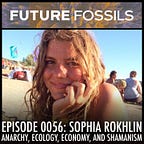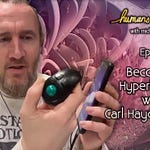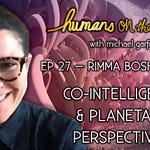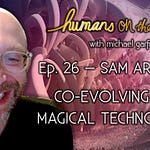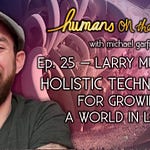This week’s guest is Sophia Rokhlin, whom I met in Portugal at Boom Festival 2016, and who just finished her Master’s of Ecological Economics in Barcelona last fall. Sophia’s currently at work on a number of cool projects, including The Environmental Justice Atlas – a database of environmental conflicts happening around the world. She’s also helping Daniel Pinchbeck write a book on ayahuasca and has worked at Kosmicare, a European psychedelic harm reduction project. http://ejatlas.orghttp://twitter.com/sophiarokhlin We Discuss: • How Spanish represents time differently than English • The politics and economics of Catalonian independence from Spain • How energy accounting, geography, history, and political ecology come together in the new field of Ecological Economics: the layer of material funds and flows behind what we think of as “the economy” – how much gold, how much sand, how much palm oil… • Her time in the Amazon studying plant medicines with the Sequoia tribe • “Flex crops” (used as a food, a fuel, and a feed) for more sustainable and resilience global agriculture • How can we properly account for all the ways our ecosystems support us without dangerously oversimplifying things? • The history (and problem) of using “ecosystem services” to quantify the economic value of nature • “Man-Age-Ment” • The Battle of Global Civilization: Technocrats vs. Mystics • And what of technoshamanism? Demetabolizing our environment. • Genpo Roshi’s Big Mind Process & voice dialogue in ego transcendence • The problem of locating yourself in a global environmental conflict without a clear front line…each of us is everywhere, so where do we stand? • Connecting and making kinship and natural rapport with elements in the global economy and learning how your life intersects with the planet-wide body of ______ (paper, palm oil, latex, etc.). • How studying economics can be like diéta, getting acquainted with something • Acting as a gateway to transcendence and altered states of consciousness • Sophia’s history of encounters with ayahuasca, and what led to the realization that shamanism is not her path • Balancing Big Picture thinking and intimacy, the social and personal, traditionally masculine and feminine modes of being • Overcoming the cognitive dissonance between the revelations of psychedelic experience and ecological defense of plant medicines • The hidden costs of regulating cannabis and other plant medicines • Her soft spot for “the clandestine economies of hackers, pirates, and shamans”…don’t create economic monocultures by commodifying everything you possibly can! • How psychedelics defy commodification – and why that’s a good thing • Ontological anarchism and the silliness of trying to impose structure onto the utterly uncontrollable mysterious reality of reality • Anarchism as a process • “To complete things is to uncomplete them.” • Unity and efficiency versus the counterclockwise heyoka medicine of necessarily contrary oppositeness • Can there even BE a counterculture in a planetary culture? • Idea Sex • Tamera Healing Biotope in Portugal and their model for Love Without Fear • Relationship Anarchy needs a community container; why polyamory can be more difficult in the city • The opposite of Tinder is having elders counsel us when we find someone in our community attractive • Feminine eldership, female guidance and leadership • Life Hack 101: Treat animals as gendered he’s and she’s instead of it’s, and you get better communication results. • The Noosphere eating the Biosphere • Jamming with nature and the importance of acoustic biodiversity • The fallacy of conservation biology and the cult of wilderness • If we really want to Make America Great Again, we’re going to need some mammoths! Subscribe: Apple Podcasts / Stitcher / SpotifyJoin the Facebook Discussion GroupSupport this show and get cool stuff!
Support this show http://supporter.acast.com/futurefossils.
Hosted on Acast. See acast.com/privacy for more information.

